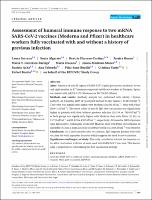Por favor, use este identificador para citar o enlazar este ítem:
https://repositorio.usj.es/handle/123456789/917
Registro completo de metadatos
| Campo DC | Valor | Lengua/Idioma |
|---|---|---|
| dc.contributor.author | Serrano Barcos, Laura | - |
| dc.contributor.author | Algarate Cajo, Sonia | - |
| dc.contributor.author | Herrero Cortina, Beatriz | - |
| dc.contributor.author | Bueno, Jessica | - |
| dc.contributor.author | Gonzalez-Barriga, Maria T. | - |
| dc.contributor.author | Ducons, Maria | - |
| dc.contributor.author | Montero-Marco, Jesica | - |
| dc.contributor.author | Acha, Beatriz | - |
| dc.contributor.author | Blanco Taboada, Ana Laura | - |
| dc.contributor.author | Sanz-Burillo, Pilar | - |
| dc.contributor.author | Yuste, Cristina | - |
| dc.contributor.author | Benito, Rafael | - |
| dc.date.accessioned | 2023-05-29T15:09:46Z | - |
| dc.date.available | 2023-05-29T15:09:46Z | - |
| dc.date.issued | 2022-09 | - |
| dc.identifier.citation | Laura Serrano and others, Assessment of humoral immune response to two mRNA SARS‐CoV‐2 vaccines (Moderna and Pfizer) in healthcare workers fully vaccinated with and without a history of previous infection, Journal of Applied Microbiology, Volume 133, Issue 3, 1 September 2022, Pages 1969–1974, https://doi.org/10.1111/jam.15699 | en_US |
| dc.identifier.issn | 1365-2672 | en_US |
| dc.identifier.uri | https://repositorio.usj.es/handle/123456789/917 | - |
| dc.description.abstract | Aims: Presence of anti-S1region of SARS-CoV-2 spike protein was analysed, at two and eight months, in 477 immunocompetent healthcare workers in Zaragoza, Spain, vaccinated with mRNA-1273 (Moderna) or BNT162b2 (Pfizer). Methods and results: Antibody analysis was performed with Alinity i System (Abbott). At 2 months, 100% of vaccinated had anti-S1 IgG (mean = 13,285 AU ml−1). This value was significantly higher with Moderna (18,192 AU ml−1) than with Pfizer (10,441 AU ml−1). The mean value of anti-S1 IgG after vaccination was significantly higher in patients with than without previous infection (18,539 vs. 7919 AU ml−1); in both groups was significantly higher with Moderna than with Pfizer (21,881 vs. 15,733 AU ml−1 and 11,949 vs. 6387 AU ml−1), respectively. At 8 months, 100% of patients were IgG positive, with higher levels with Moderna than with Pfizer. Nevertheless, in ensemble of cases, a mean decrease of antibody levels of 11,025 AU ml−1 was observed. Conclusion: At 2 and 8 months after vaccination, IgG response persists with both vaccines but with important decrease which suggests the need for revaccination. Significance and impact of study: The study contributes to know the immune status after vaccination with two of more used anti-SARS-CoV-2 vaccines. This knowledge is important for establishing the best vaccination strategy | en_US |
| dc.format.extent | 6 p. | en_US |
| dc.format.mimetype | application/pdf | en_US |
| dc.language.iso | eng | en_US |
| dc.publisher | WILEY | en_US |
| dc.rights | Atribución 4.0 Internacional | * |
| dc.rights.uri | http://creativecommons.org/licenses/by/4.0/ | * |
| dc.subject | Anti-S IgG SARS-CoV- 2 | en_US |
| dc.subject | Healthcare workers | en_US |
| dc.subject | Immune response | en_US |
| dc.subject | Moderna | en_US |
| dc.subject | mRNA SARS-CoV- 2 vaccines | en_US |
| dc.subject | Pfizer | en_US |
| dc.subject | Post-vaccination | en_US |
| dc.subject | RIPOVAC | en_US |
| dc.title | Assessment of humoral immune response to two mRNA SARS-CoV-2 vaccines (Moderna and Pfizer) in healthcare workers fully vaccinated with and without a history of previous infection | en_US |
| dc.type | journal article | es_ES |
| dc.identifier.doi | https://doi.org/10.1111/jam.15699 | en_US |
| dc.rights.accessRights | open access | es_ES |
| Aparece en las colecciones: | Artículos de revistas | |
Ficheros en este ítem:
| Fichero | Descripción | Tamaño | Formato | |
|---|---|---|---|---|
| Assessment of humoral immune response to two mRNA SARS-CoV-2 vaccines (Moderna and Pfizer) in healthcare workers fully vaccinated with and without a history of previous infection.pdf | 370,88 kB | Adobe PDF |  Visualizar/Abrir |
Este ítem está sujeto a una licencia Creative Commons Licencia Creative Commons

